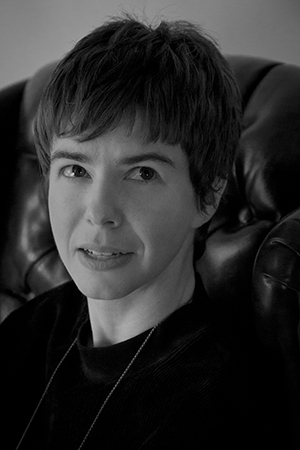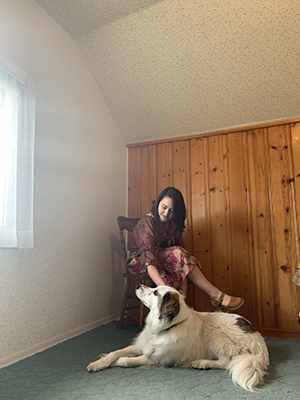How to Stay Accountable: L'Amour Lisik in Conversation with River Halen Guri

Malahat Review Publicity Manager L'Amour Lisik talks with River Halen Guri, winner of the 2019 P.K. Page Founders' Award for Poetry for "Speech," which appeared in the Queer Perspectives Issue #205. Read "Speech" on our website.
Read what judge Shane Rhodes had to say about "Speech" on the 2019 P.K. Page Founders' Award announcement page, and read also River Halen Guri's statement about receiving the award.
Your poem, “Speech,” which won the P.K. Page Founders’ Award, appeared in the Queer Perspectives Issue #205. What did it mean for you to be part of the Queer Perspectives Issue?
Are there any writers whose work you especially admired in the issue?
It was lovely to be invited to contribute to the Queer Perspectives issue, and it made my inner 19-year-old very happy—both in terms of being publicly and “officially” recognized as queer, which isn’t an experience I’ve consistently had access to despite coming out pretty young, and in terms of breaking into what is, in my mind, a historically pretty conservative Canadian litmag with a saucy poem.
Lots of names in that issue are exciting and important to me—new voices plus voices I turned to coming up. I read Anaheed Saatchi’s piece on body hair with special interest because I am also writing about body hair, which for me is a subject that brings all the big stuff together—gender, race, sexuality, feminisms, family and culture, elementary school, illness—in a very complicated way.
“Speech” opens with the lines:
Annie Edson Taylor was sixty-three years old
when she became the first person to survive
Niagara Falls in a barrel
and I was six
in the carpeted section of the basement
humping a large brown corduroy
pillow the length of my torso.
Your poem weaves together two seemingly disparate story arcs. How did these two very different stories come together for you in one poem and how did the poem evolve as you wrote? How does fame fit in a poem that is so concerned with personal risk, safety, dying poverty, and power?
Haha okay… so here is something I never thought I would write to a stranger on the internet: the connection is literal. When I was a kid I would hump pillows, but I had no idea what masturbation was, so I conceptualized it as a game of riding a barrel over Niagara Falls. As you do! Obviously! At the time I did not know those details about Annie Edson Taylor, but that came later, with research.
I get this kind of question about my work fairly often, about things that seemingly don’t belong together being paired, and the answer is almost always that they do belong together—it really happened or happens that way. My process of writing the poem wasn’t about making stuff up or strategizing which two things to combine, but about listening with incrementally greater care to my reality.
As for fame, it’s a simultaneous state of power (everyone is watching) and vulnerability (everyone is watching), which is a lot like embodying or practicing queer identities in a cis-het [cisgender-heteronormative] “surveillance” context. Nothing about fame qua fame guarantees material wealth or bodily safety.
In your statement about receiving the P.K. Page Founders’ Award and on legacies of exclusion, you said: “My first thought was that this list of mostly male, almost exclusively white winners with me at the recent end of it functioned as a complete erasure of my teachers. The writers who showed me, and continue to show me, that poetry can be a technology of survival, a place to make idiosyncratic music that heals and confronts, a place to listen to yourself without ulterior motive and address whom you actually want to reach—that I could do something other than churn out repressed cookie-cutter imitations of the poems I’d read in school and/or saw praised in mainstream venues—are mostly QTBIPOC [Queer, Trans*, Black, Indigenous, & People of Colour] writers.” (Read the complete statement here.) Could you talk a bit about the teachers you mentioned? How do you continue their work in your writing practice and your daily life?
I’m glad you asked this. It’s a lot of different people through my whole life who have taught me in this way, and I want to be clear that when I use the term “teacher” all I’m saying is that I learned from my encounter with that person or their work. I’m not making a claim to be associated with them or a bid for approval or trying to imply that my learning is done or that the person in question would not/does not have serious and hard questions for me.
Also when I talk about the experience of being a white writer learning from writers who are BIPOC, I need to specify that this learning, to be anything other than straight-up appropriation, has to happen primarily in terms of examining context and interrogating my complicity as a white person in the oppressive nature of that context. It can’t just be “oh, that’s a cool technique! How can I do that too?” It has to be about learning my role and place in relation to others, what I actually have to offer and how I can enter the conversation responsibly. I haven’t always gotten it right.
One really beautiful lesson that I learned from a QTBIPOC writer and disability justice activist, Leah Lakshmi Piepzna-Samarasinha, was about saying (I am paraphrasing here—this was either in an interview or a talk and I can’t find a written reference for it) fuck literature and its mechanisms of approval, and about reclaiming those elements of language that we uphold as beautiful and “literary” for political and community purposes. That even if what she had written resembled a literary memoir or a literary poem, it was accountable not to editors and critics and booksellers, but to her communities and to her personal experience of being alive and to the changes she wanted to see.
I think about that directive, fuck literature, every time I sit down to write—about how to stay aware of who I’m really speaking to, whose perspective matters, about how a lot of what commonly gets valued as literature could be characterized as a way to isolate human creative impulses from their inherent political power and to erase the collaborative nature of thinking. I think about how to keep those connections alive in my work, how to stay accountable to what’s important.
I should also say that when I thanked Leah Lakshmi Piepzna-Samarasinha for planting this idea in me after a talk she gave, she expressed that this idea was something she too had picked up from others at some point—I’m not sure how comfortable she’d be being credited as its originator, but anyway for me she was its vector.
The Malahat Review has had several special issues, the most recent one being #205 Queer Perspectives. Ideally, what special issue would you like to see next?
So many… Prison abolition issue, refugee rights issue, climate activism issue, disability justice issue, late bloomers issue, sluts issue, reproductive rights issue, collaborations issue… the list goes on! And I’d love to see the Indigenous perspectives issue become a recurrent thing.
Do you have any project(s) you’re currently working on? What are you reading right now, and what’s next on your list to read?
I’m working on my interminable second book, which is a mixture of “broken” essays and poetry, and is currently about 300 pages long, and is probably at least two books. In the meantime, while I wait for that situation to sort itself out, I’ve been releasing small sections of it as chapbooks, which are available on my soon-to-be-launched website (helenguri.net).
I just finished reading Joshua Whitehead’s Full Metal Indigiqueer, which I loved for (among other things) the way it makes legibility and illegibility work together very powerfully, and the first volume of Proust, which mostly pissed me off but did teach me some things about beautiful long sentences and how jealousy is a performance. Last night I started NourbeSe Philip’s Looking for Livingstone, which is recently back in print, and soon will be Kim Hyesoon’s Autobiography of Death.
* * * * * * * *










